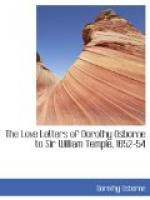it was guilty in being greater than is allowable for
things of this world. ’Tis not a melancholy
humour gives me these apprehensions and inclinations,
nor the persuasions of others; ’tis the result
of a long strife with myself, before my reason could
overcome my passion, or bring me to a perfect resignation
to whatsoever is allotted for me. ’Tis
now done, I hope, and I have nothing left but to persuade
you to that, which I assure myself your own judgment
will approve in the end, and your reason has often
prevailed with you to offer; that which you would
have done then out of kindness to me and point of honour,
I would have you do now out of wisdom and kindness
to yourself. Not that I would disclaim my part
in it or lessen my obligation to you, no, I am your
friend as much as ever I was in my life, I think more,
and I am sure I shall never be less. I have known
you long enough to discern that you have all the qualities
that make an excellent friend, and I shall endeavour
to deserve that you may be so to me; but I would have
you do this upon the justest grounds, and such as
may conduce most to your quiet and future satisfaction.
When we have tried all ways to happiness, there is
no such thing to be found but in a mind conformed to
one’s condition, whatever it be, and in not
aiming at anything that is either impossible or improbable;
all the rest is but vanity and vexation of spirit,
and I durst pronounce it so from that little knowledge
I have had of the world, though I had not Scripture
for my warrant. The shepherd that bragged to
the traveller, who asked him, “What weather it
was like to be?” that it should be what weather
pleased him, and made it good by saying it should
be what weather pleased God, and what pleased God
should please him, said an excellent thing in such
language, and knew enough to make him the happiest
person in the world if he made a right use on’t.
There can be no pleasure in a struggling life, and
that folly which we condemn in an ambitious man, that’s
ever labouring for that which is hardly got and more
uncertainly kept, is seen in all according to their
several humours; in some ’tis covetousness, in
others pride, in some stubbornness of nature that
chooses always to go against the tide, and in others
an unfortunate fancy to things that are in themselves
innocent till we make them otherwise by desiring them
too much. Of this sort you and I are, I think;
we have lived hitherto upon hopes so airy that I have
often wondered how they could support the weight of
our misfortunes; but passion gives a strength above
nature, we see it in mad people; and, not to flatter
ourselves, ours is but a refined degree of madness.
What can it be else to be lost to all things in the
world but that single object that takes up one’s
fancy, to lose all the quiet and repose of one’s
life in hunting after it, when there is so little
likelihood of ever gaining it, and so many more probable
accidents that will infallibly make us miss on’t?
And which is more than all, ’tis being mastered




